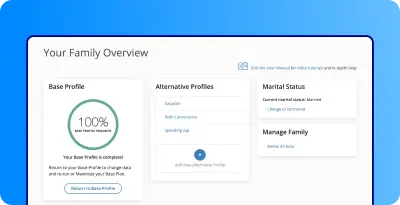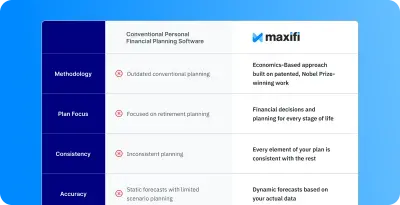Estate Attorney
An estate attorney (also called an estate planning lawyer or wills and estates lawyer) helps clients create and manage legal documents such as wills, trusts, and powers of attorney. They guide families through estate law and probate, while also advising on strategies to reduce taxes and protect assets.
Estate attorneys become particularly valuable when circumstances involve complexity beyond basic document preparation. This includes situations with significant assets, business ownership, property in multiple states, blended families, special needs dependents, or potential estate tax exposure at federal or state levels. While simple situations like basic wills can sometimes be handled through online services, more complex estate planning typically benefits from professional legal guidance to ensure documents are properly executed, tax strategies are optimized, and all elements of the estate plan work together cohesively.
This guide explores what estate attorneys do, key estate planning documents they prepare, when to work with an estate law attorney, important questions to ask during consultations, and common estate planning scenarios that benefit from professional guidance. Whether evaluating estate planning needs or seeking to understand the role of estate attorneys in protecting assets and ensuring wishes are honored, these educational concepts provide context for discussions with estate planning professionals.

Key Takeaways
- Estate attorneys help create wills, trusts, and powers of attorney while guiding families through probate and advising on tax strategies
- Federal estate tax exemption is $13.99 million for 2025 ($27.98 million for married couples), increasing to $15 million ($30 million for couples) starting January 1, 2026 under the One Big Beautiful Bill Act
- Twelve states plus District of Columbia have estate taxes with exemptions ranging from $1 million to $13.99 million, requiring state-level planning for residents
- Five states have inheritance taxes (Kentucky, Maryland, Nebraska, New Jersey, Pennsylvania) paid by beneficiaries rather than estates - Iowa fully repealed its inheritance tax as of January 1, 2025
- Beneficiary designations on retirement accounts and life insurance supersede wills, making coordination essential to avoid unintended distributions
- Multiple documents work together in comprehensive estate plans including wills, trusts, financial and healthcare powers of attorney, living wills, and HIPAA authorizations
- Estate plans should be reviewed every 3-5 years minimum and immediately after major life events like marriage, divorce, births, deaths, or moves to different states
- Digital assets require specific authorization for executors to access online accounts, cryptocurrencies, and social media
- DIY estate planning carries significant risks including improperly executed documents, unintended tax consequences, and failure to address complex issues
- Estate planning remains important even below federal exemption thresholds
What Does an Estate Attorney Do?
An estate law attorney specializes in helping people organize and transfer their assets during life and after death. Their work typically includes:
- Drafting and updating estate documents such as wills, trusts, living wills, and powers of attorney.
- Guiding families through probate (the legal process of settling an estate after someone passes away). Probate is public, typically takes 6-24 months, and costs vary significantly by state but can range from less than 1% to 7% or more of the estate's value in legal fees and court costs, depending on the jurisdiction and complexity. One major benefit of trusts is that they allow assets to bypass probate entirely, potentially saving time, money, and maintaining privacy.
- Advising on how to address estate tax considerations. For 2025, the federal estate tax exemption is $13.99 million per individual ($27.98 million for married couples). In July 2025, the One Big Beautiful Bill Act was signed into law, permanently increasing this exemption to $15 million per individual ($30 million for married couples) starting January 1, 2026, with annual inflation adjustments thereafter. This means most estates won't face federal estate taxes. However, 12 states plus the District of Columbia have their own estate taxes with exemptions ranging from $1 million to $13.99 million (states include Connecticut, Hawaii, Illinois, Maine, Maryland, Massachusetts, Minnesota, New York, Oregon, Rhode Island, Vermont, and Washington), and 5 states have inheritance taxes (Kentucky, Maryland, Nebraska, New Jersey, and Pennsylvania). State-level tax planning may be important for residents of these states.
- Providing guidance on complex issues such as blended families, business ownership, or charitable giving.
- Coordinating beneficiary designations on retirement accounts, life insurance, and other financial accounts to ensure they align with your overall estate plan. These designations supersede your will, so proper coordination is essential.
- Addressing digital assets including online accounts, cryptocurrencies, digital photos, and social media, which require specific authorization for executors to access. This is an increasingly important area of estate planning as more assets exist in digital form.
While many individuals can handle straightforward situations like naming a 401(k) beneficiary, estate attorneys are often valuable when faced with more complicated situations.
The terms "estate attorney," "wills and estates lawyer," and "estate planning lawyer" are often used interchangeably, though some practitioners distinguish between them. A wills and estates lawyer may focus primarily on drafting wills and guiding families through probate, while an estate planning lawyer typically provides broader services like setting up trusts, tax strategies, and asset protection. In practice, many attorneys offer the full range of estate planning services regardless of their specific title.
Key Estate Planning Documents
An estate attorney helps create several critical documents beyond just a will:
- Will: Specifies how assets are distributed, names guardians for minor children, and designates an executor. Goes through probate and becomes public record.
- Revocable Living Trust: Allows assets to avoid probate, can be changed anytime, and remains private. Offers no direct tax benefits but provides significant practical advantages.
- Irrevocable Trust: Cannot be changed once established, but offers asset protection and potential tax benefits. Used for specific planning goals like special needs or estate tax reduction.
- Financial Power of Attorney: Designates someone to handle financial decisions if you're incapacitated.
- Healthcare Power of Attorney (Healthcare Proxy): Designates someone to make medical decisions on your behalf if you cannot.
- Living Will/Advance Directive: Specifies your end-of-life care wishes, including life support preferences.
- HIPAA Authorization: Allows designated individuals to access your medical information.
- Pour-Over Will: A special type of will often used alongside a trust. It "pours over" any assets not transferred to your trust during your lifetime into the trust after death. This acts as a safety net to ensure all assets ultimately flow according to your trust's terms, though these assets still go through probate.
Many comprehensive estate plans include multiple documents working together.
When Should You Work with an Estate Law Attorney?
You don't necessarily need an estate attorney for every situation, but their guidance often becomes especially valuable when your financial or family circumstances are more complex. Common times to consider hiring one include:
- Major Life Changes: Marriage, divorce, having children or entering retirement.
- Complex Assets: Owning a business, property in multiple states or significant investments.
- Family Considerations: Blended families, dependents with special needs, or charitable giving goals.
- Tax Exposure: When your estate may be large enough to trigger estate taxes (over $15 million federally starting in 2026, or lower thresholds in states with estate/inheritance taxes).
- Moving to a Different State: Estate laws vary by state, requiring updates to ensure documents remain valid and optimal.
- Outdated Plans: If your estate documents are more than 5 years old or predate major life changes (marriage, divorce, births, deaths, significant asset changes), they likely need review.
- Recent Tax Law Changes: With the One Big Beautiful Bill Act changing estate tax exemptions in 2026, individuals with existing estate plans may want to consult an attorney to determine if adjustments are needed.
Even if your estate seems straightforward, an attorney can help you work through an estate planning checklist and ensure all your estate documents comply with the law.
Questions to Ask Your Estate Attorney
Meeting with an estate planning lawyer can feel overwhelming, but preparing a few key questions helps you make the most of your time.
Is Your Primary Specialty in Estate Planning?
Particularly if you have a more nuanced situation, you may want to choose an attorney who specializes in estate planning. An estate planning specialist will be up to date with all changes to legal requirements and will be well-versed in the legal technicalities to ensure your estate documents are clear and effective.
What Services Do You Provide?
Clarify whether the attorney handles only wills and probate, or if they also create trusts, advise on estate taxes, and manage more complex planning. Compare what you require with their specific skills and select someone who addresses your needs. It's also worth asking if they actually execute the plan as some lawyers only draw up the estate planning documents, while others also execute the associated trusts.
How Do You Charge for Your Services?
Some attorneys bill hourly, while others offer flat fees for specific documents like wills or living trusts. Understanding costs upfront avoids surprises.
What Experience Do You Have with Cases Like Mine?
If you own a business, have property in multiple states, or want to set up charitable giving, ask whether the attorney has handled similar estates.
How Often Should I Update My Estate Plan and Can You Help with This?
Laws and life circumstances change. A good estate law attorney will discuss how often to review your estate planning checklist. Many attorneys recommend reviewing your estate plan every 3-5 years at minimum, and immediately after major life events such as marriage, divorce, birth or adoption of children, death of a beneficiary or executor, significant changes in assets, moving to a different state, or major changes in tax laws. Some estate planning attorneys will annually review your affairs for a fee to help you adjust your plan as necessary.
FAQs About Estate Attorneys
Important Considerations
This content reflects estate planning laws, federal and state estate tax exemptions, probate procedures, and legal requirements as of 2025 and is subject to change through legislative action, regulatory updates, or court decisions. Federal estate tax exemptions increased from $13.99 million in 2025 to $15 million starting January 1, 2026 under the One Big Beautiful Bill Act signed July 4, 2025. State estate and inheritance tax laws vary by jurisdiction and may be modified through state legislation. Legal requirements for estate planning documents including execution, witnessing, and notarization vary significantly by state and are subject to statutory changes.
This content is for educational and informational purposes only and does not constitute legal, tax, or financial advice. The information provided represents general educational material about estate attorneys and estate planning concepts and is not personalized to any individual's specific circumstances. Estate planning involves complex legal and tax considerations that vary dramatically based on family structure, asset composition, state of residence, and individual goals. Legal requirements for document execution, probate procedures, tax implications, and planning strategies differ by state and individual situation. The cost ranges, timelines, and procedures discussed are general estimates that vary significantly by jurisdiction and complexity. The examples and scenarios presented are for educational illustration only and do not constitute recommendations for any individual's estate planning decisions.
Individual estate planning decisions regarding wills, trusts, powers of attorney, beneficiary designations, tax strategies, and document execution must be evaluated based on your unique situation, including asset types and values, family circumstances, state of residence, tax exposure, health considerations, and personal goals. Estate and tax laws are complex and subject to frequent changes. What may be discussed as common in estate planning literature may not be appropriate for any specific person. Please consult with qualified estate planning attorneys, tax professionals, and financial advisors for personalized guidance before creating, signing, or relying on any estate planning documents. This educational content does not establish any attorney-client, tax preparation, or advisory relationship. Estate planning attorneys are licensed to practice in specific states, and laws vary by jurisdiction.
Disclaimer
This article provides general educational information only and does not constitute legal, tax, or estate planning advice. Beneficiary designations, estate laws, and tax regulations vary significantly by state, account type, and individual circumstances. The information presented here is not intended to be a substitute for personalized legal or financial advice from qualified professionals such as estate planning attorneys, tax advisors, or financial planners. Beneficiary rules are subject to change and can have significant legal and tax implications. Before designating, changing, or making decisions about beneficiaries, you should consult with appropriate professionals who can evaluate your specific situation and applicable state and federal laws.




